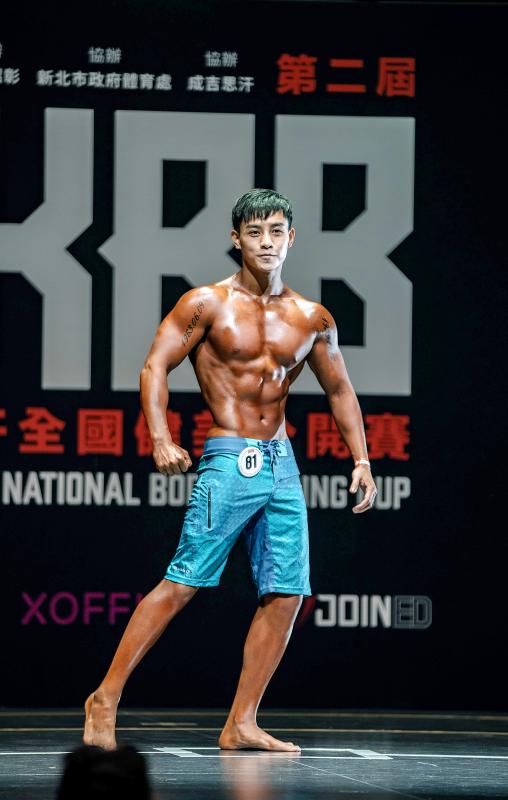Former member of boy band TOP1 Sean Tseng has since gone solo, not only releasing his own records, but also becoming a fitness expert and opening his own fitness studio. He recently took part in the second Genghis Khan Cup National Bodybuilding Cup contest organized by celebrity gym owner Holger Chen, and despite not winning any titles, he says it was still a “bromantic experience.”
Sean prepared for the contest by putting himself through three months of rigorous dietary restrictions and intense exercise that made his body as fit and lean as a character from the Ultimate Muscle game series, with perfectly sculpted abs, pecs and other muscle groups.
Sean observed: “I knew before I signed up that I didn’t stand a chance of winning, but I still signed up to set myself a goal. The person I really wanted to beat was last year’s me.”

Photo courtesy of Sean Tseng 照片:曾奕翔提供
(Liberty Times, translated by Julian Clegg)
前男團TOP1男子漢成員曾奕翔,單飛發片成了健身達人,並開設健身工作室。他日前參加館長陳之漢舉辦的成吉思汗盃第二屆的全國健美公開賽,雖然最後沒有得名,仍表示這就是種「男人的浪漫」。
曾奕翔為了比賽,經過長達三個月的飲食控制與密集鍛鍊,操練出猶如魔鬼筋肉人般的健壯體態,包括腹肌、胸肌及各個肌群都練出完美線條。
曾奕翔也談到:「報名前就知道這是一場沒有勝率的賽事,為了設立目標,我還是報名參加,自己最想贏的人,就是去年的自己」。
(自由時報記者陽昕翰)

In today’s digital age, every click and swipe generates data, and the need for reliable and efficient data management has become critical. This is where data centers come into play. Data centers include servers, storage drives, networking equipment, and other hardware to manage, process, and store vast amounts of digital information. __1__ For that reason, some companies are pursuing an unusual idea: placing data centers under the surface of the ocean. What makes underwater data centers cheaper than traditional land-based ones? For one thing, the cool temperature of the ocean means that companies can cut down on the high cost of

A: Apart from BTS’ J-Hope and EXO’s Xiumin, Hong Kong singer Eason Chan is holding six concerts in Kaohsiung. B: And versatile British musician Jacob Collier is visiting Taiwan for the first time, performing in New Taipei City tonight. A: US singer Lauv and rock band LANY will also stage individual shows in Kaohsiung next week. B: Plus, Singaporean singer JJ Lin will hold two concerts at the Taipei Dome in early June. A: Which show are you going to? A: 除了BTS的J-Hope和EXO的Xiumin,香港歌王陳奕迅正在高雄熱唱6場。 B: 而多才多藝的英國歌手雅各柯里爾首度訪台,今晚即將在新北開唱! A: 美國歌手洛夫、搖滾樂團藍尼下週也分別在高雄演出。 B: 此外新加坡歌王林俊傑則將於6月初,首次挑戰台北大巨蛋嗨唱兩場。 A: 你想去聽誰的演唱會? (By Eddy Chang, Taipei Times/台北時報張迪)

US President Donald Trump on Monday last week signed the TAKE IT DOWN ACT (Tools to Address Known Exploitation by Immobilizing Technological Deepfakes on Websites and Networks Act), bipartisan legislation that enacts stricter penalties for the distribution of non-consensual intimate imagery, sometimes called “revenge porn,” as well as deepfakes created by artificial intelligence. The measure, which goes into effect immediately, was introduced by Sen. Ted Cruz, a Republican from Texas, and Sen. Amy Klobuchar, a Democrat from Minnesota, and later gained the support of First Lady Melania Trump. Critics of the measure, which addresses both real and artificial intelligence-generated imagery, say

1. 我不夠快。 ˇ I wasn’t fast enough. χ I wasn’t enough fast. 註:enough用作副詞時,一般放在它修飾的形容詞或其他副詞後面。例如: The tea is hot enough.(茶是夠熱。) He did not work hard enough.(他不夠用功。) 但enough用作形容詞時,前置或後置都可以。例如: There is enough food (/food enough) for us. 2. 今晚七時我們將開董事會。 ˇ We are having a board meeting at seven o’clock this evening. ˇ We are having a board meeting this evening, at seven o’clock. χ We are having a board meeting this evening at seven o’clock. 註:如果有多個時間副詞,一般單位大的放在單位小的後面。例如: I was born in May 1939. The meeting was held at five o’clock yesterday afternoon. 但如果大的單位是說話者強調的重點,則可以放在前面,但後面要有逗號,表示停頓。例如: He arrived yesterday afternoon, at about five o’clock. 3. 我生於麻州波士頓。 ˇ I was born in Boston, Massachusetts. χ I was born in Massachusetts, Boston. 註:一般而言,地點副詞的位置,範圍大的放在範圍小的後面。例如: Before